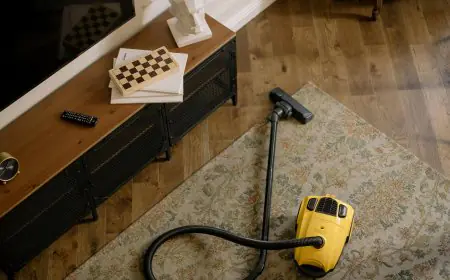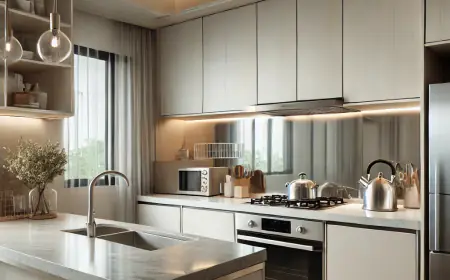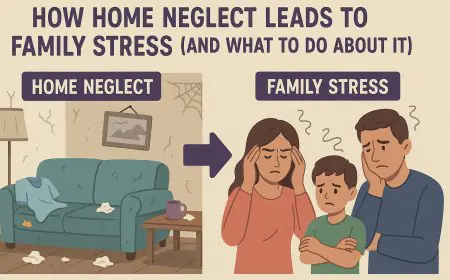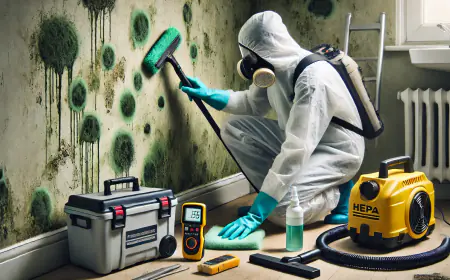How Home Neglect Leads to Family Stress (and What to Do About It)
A harmonious home isn’t just about the people who live in it. The state of the house itself can significantly shape family dynamics and emotional well-being.
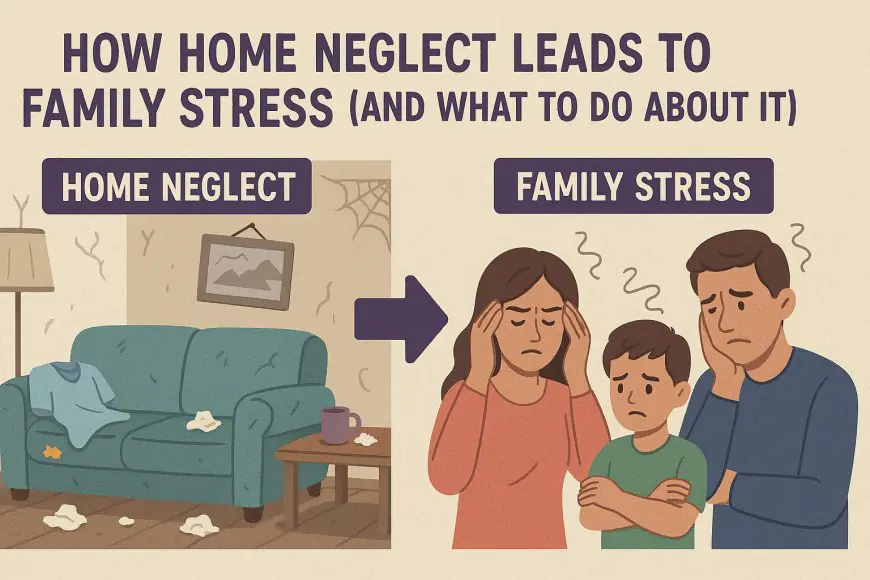
Unresolved household issues, like unpaid bills or neglected maintenance, can strain family relationships. Small arguments about clutter, broken appliances, or repair costs may seem minor, but relationship therapists warn they can quickly escalate and disrupt communication at home. Over time, this kind of stress can take a toll, making the home less enjoyable for everyone.
This blog explores the relationship between home care and family harmony, diving deeper into how thoughtful home management can reduce stress, minimize conflicts, and ultimately strengthen your family bonds.
A well-maintained home isn’t just a physical space—it’s the foundation for a peaceful, supportive family environment.
The Connection Between Home and Family Harmony
Your home is more than just walls and a roof; it’s a foundation for your family’s stability and happiness. However, when maintenance is neglected, it can quickly become a source of stress.
Imagine living with a leaky faucet that drips incessantly or coping with a broken HVAC system during extreme weather. These seemingly minor issues can escalate into significant household tension.
Studies suggest that cluttered or poorly maintained homes contribute to feelings of anxiety and frustration. For many families, unexpected repairs and the associated costs add another layer of pressure, leading to arguments, blaming, or even feelings of guilt among family members.
The Impact of Financial Stress from Home Repairs
Small issues like a crack in the wall or a faulty appliance can quickly escalate into costly fixes if ignored. These expenses can disrupt budgets, creating pressure and tension that affect the entire household.
But it’s not just about the repair costs. Neglected issues can disrupt daily life—like an unusable bathroom or a power outage—causing chaos and testing everyone’s patience. Being proactive about maintenance can prevent many of these problems and the stress they bring.
The Hidden Costs of Neglecting Home Maintenance
Thinking, “I’ll fix it later,” can lead to unexpected expenses and emotional strain. Delaying maintenance can cause minor problems to spiral into major, costly repairs.
Small Problems Can Become Big Headaches
For example, a small roof leak might cost $200 to fix. If left unattended, it could lead to water damage, mold, or structural issues costing $10,000 or more. Similarly, ignoring clogged gutters can result in a flooded basement or foundation cracks, costing thousands to repair, while gutter cleaning typically costs just $150-$300.
Here’s what you can do:
-
Conduct regular checks. Walk around your home monthly to spot visible issues like leaks or cracks.
-
Create a maintenance schedule. Plan tasks like cleaning gutters, servicing your HVAC, and inspecting your roof.
-
Budget for upkeep. Experts recommend saving 1-3% of your home’s value annually for maintenance.
Neglect Can Hurt Your Finances—and Relationships
Procrastinating on home repairs doesn’t just impact your wallet—it can strain relationships too. Financial stress is one of the top causes of family conflict. Surprise repair bills can spark arguments, especially when they could have been avoided.
For instance, delaying HVAC repairs might seem harmless until the system fails during a heatwave, resulting in a $6,000 replacement bill. Such situations often lead to frustration and blame, adding unnecessary tension to your home.
By addressing maintenance proactively, you can avoid financial strain, costly repairs, and emotional stress—all while keeping your home running smoothly. Here’s how:
-
Communicate and plan together. Sit down with your family and discuss a home maintenance budget.
-
Set aside an emergency fund. Aim to have at least three to six months of living expenses saved, specifically for unexpected repairs.
-
Prioritize preventive maintenance. Spending a little now can save you a lot later—both financially and emotionally.
The Long-Term Impact on Your Home’s Value
Neglecting maintenance doesn’t just hurt your wallet today; it can also reduce your home’s value over time. According to the National Association of Realtors, well-maintained homes can sell for up to 10% more than those with visible issues. Buyers are quick to walk away from properties with problems like water damage or outdated systems, knowing they’ll have to take on costly repairs themselves.
In one case, a homeowner skipped repainting their home’s exterior for years. By the time they decided to sell, the peeling paint and minor wood rot scared off potential buyers. The final sale price was $25,000 below similar homes in the area, all because of deferred maintenance.
Our Advice:
-
Invest in curb appeal. Simple tasks like repainting, landscaping, and fixing cracks in the driveway can dramatically boost your home’s value.
-
Get an annual inspection. Consider hiring a professional like the best plumbers in boulder to check for hidden issues, like plumbing leaks before they worsen.
Budgeting for Home Maintenance to Prevent Family Stress
Home maintenance ultimately comes down to one thing: money. It costs to keep things in shape. The good news? A little preparation can go a long way in protecting your home and giving your family peace of mind. By creating a home maintenance plan and budget, you can take a simple yet effective step to avoid expensive surprises.
How to Create a Maintenance Fund
Having a dedicated home maintenance fund ensures you’re financially prepared for both routine upkeep and unexpected repairs. Without one, sudden expenses can strain your budget and cause unnecessary stress.
Here’s how to build your fund effectively:
-
Determine Your Savings Goal – Set aside 1%–3% of your home’s value annually.
-
Automate Your Savings – Set up a dedicated savings account and schedule automatic transfers.
-
Adjust for Home Age & Condition – Older homes or those with past issues may require higher savings.
-
Plan for Emergencies – Unexpected breakdowns happen, so having extra funds ensures quick repairs.
-
Reevaluate Yearly – Review your budget annually to adjust for inflation and home wear.
Cost-Effective Maintenance Tips
Routine maintenance helps prevent expensive emergency repairs, keeping your home safe and functional. A little effort now can save you thousands in the long run. Here are some smart ways to maintain your home affordably:
-
HVAC Maintenance – Schedule seasonal check-ups to prevent costly failures.
-
Roof Inspections – Check annually for damage or leaks to avoid major repairs.
-
Gutter Cleaning – Regular cleaning prevents water damage and foundation issues.
-
Plumbing Checks – Fix small leaks early to avoid high water bills and mold.
-
Seal Windows & Doors – Improve energy efficiency and reduce heating/cooling costs.
-
Pest Control – Prevent infestations that could lead to structural damage.
A well-planned home maintenance budget isn’t just about protecting your property—it’s about ensuring your family’s comfort, safety, and financial stability. By setting aside funds and staying on top of regular upkeep, you can prevent costly surprises and reduce stress. A little preparation today can save you time, money, and headaches in the future. Start building your maintenance plan now, and enjoy the peace of mind that comes with a well-cared-for home.
The Emotional and Mental Health Benefits of a Well-Maintained Home
Your home’s condition has a deep impact on your family's emotional and mental well-being. A house that is tidy, organized, and in good condition fosters peace, comfort, and a positive atmosphere.
A Clutter-Free Space Improves Mood
Research from Princeton University found that clutter can lead to feelings of irritability and difficulty focusing. For families, this means that disorganized spaces can make tempers run high while reducing the quality of time spent together. On the flip side, a clean, well-maintained home creates a calmer environment, making it easier for everyone to connect and relax.
Well-Maintained Homes Strengthen Family Bonds
When your home is running smoothly, it becomes the backdrop for stress-free family moments. Whether it’s a Sunday dinner in the kitchen or a movie marathon in the living room, a functional space allows your family to build positive experiences together without distractions from maintenance issues.
Practical Steps to Keep Your Home and Family in Sync
Caring for your home doesn’t have to fall on one person’s shoulders. Getting the entire family involved not only divides responsibility but also creates an opportunity to work together and bond.
Schedule Regular Home Check-Ups
Set a monthly or quarterly schedule to inspect key areas of your home. This can include checking for leaks, replacing HVAC filters, and testing smoke detectors. Assign different members of your household small, manageable tasks so that home care becomes a shared responsibility.
Build a Family Home Improvement Plan
Sit down as a family to discuss upcoming maintenance or improvement projects. Whether it’s painting the living room or fixing a garden fence, working on the home as a team brings a shared sense of accomplishment. Plus, this exercise fosters communication and teamwork among family members.
Integrate Maintenance Into Daily Life
Setting up a simple chore schedule can make upkeep easier. Assign routine tasks like vacuuming, taking out the trash, or a quick weekly decluttering session to different members of the household. This ensures maintenance becomes a habit for everyone and doesn’t fall to one person alone.
A Stable Home = A Happy Family
Your home is a reflection of your priorities, and maintaining it isn’t just about keeping the roof over your head. It’s an investment in your family’s happiness, stability, and emotional health.
By addressing maintenance proactively, you can avoid sudden financial stress, improve your family’s mental well-being, and create a welcoming environment where everyone feels at ease. Taking small, consistent steps to care for your home ultimately leads to big rewards for your family relationships.
Start today by creating your own maintenance plan. Remember, a well-cared-for home makes all the difference in keeping stress at bay and transforming your house into a happy family haven.
What's Your Reaction?







